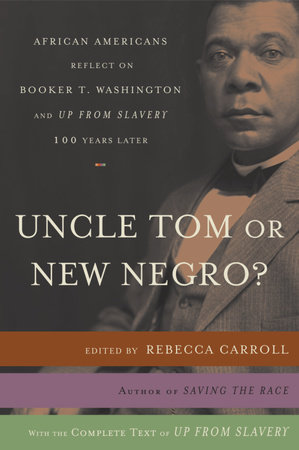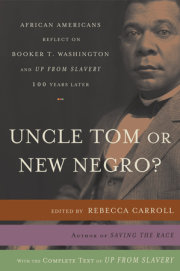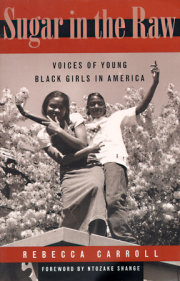CHAPTER I
DR. BILL E. LAWSON,
Philosophy Scholar
Bill E. Lawson is distinguished professor of philosophy at the University of Memphis. He received his PhD from the University of North Carolina at Chapel Hill, and his professional appointments include Spelman College, West Virginia University, and the University of Delaware.My general sense of Booker T. Washington is that he was committed to the betterment of black people in the United States and that he was very forward-looking and insightful. I think people often fail to appreciate his insights, particularly with regard to race relations. People need to view Washington as a pragmatist in the John Dewey sense of pragmatism, where you're really working to solve a significant problem. Washington's problem was: How do you resolve or improve race relations between black people and white people in the South, given the history of race and racism in the United States at that particular point in history? He thought that the best way to do that was for the races to work together, and in order to accomplish that, black people had to be able to bring something to the table. That's what building Tuskegee Institute was about: bringing something to the table. Some people think that his position demeaned black people, but while Washington did acknowledge that there were blacks that deserved respect because of their accomplishments, those were not the blacks he was trying to reach. Washington never denied the humanity of black people.
I am defending Booker T. Washington because many black intellectuals seem to be against him without any knowledge of his writings or life. During the 1960s, when black nationalism became the rage, people read certain select things. Subsequently, most people know or have read only three things about Booker T. Washington at best:
Up from Slavery, the Atlanta Exposition speech, and "Of Mr. Booker T. Washington and Others," the essay by W. E. B. Du Bois. Sometimes they know the Dudley Randall poem "Booker T. and W. E. B." If you read
Up from Slavery in isolation from Washington's other works, then I do think that you will get a skewed view of who and what he was. But when you read
Working with the Hands,
My Larger Education,
The Man Farthest Down, the biography he wrote of Frederick Douglass, or his letters and read what he wrote about his projects, you come away with a completely different view of what Washington was trying to do.
For example, Washington never said, as many have claimed, that black people should get only an industrial education. He never said that black people shouldn't participate in the political process. What he did say was, blacks should be able to secure education consistent with their ability, and if there are going to be voting requirements made for black people, the same requirements should be made for white people. He also said that the electorate should be literate; people should be able to read and write if they're going to participate in the political process. But we should consider the historical moment; it was a time when many white people were predisposed to dislike black people. Washington understood that black people had to overcome the strong dislike of some whites, while simultaneously working with the white people who were concerned with the advancement of black people. Did most white people want to have the kind of social interaction with black people that we take for granted now? No! It's not really a matter of whether black people wanted to have social interaction with white people. If you are a leader, you have a vision of how these things should play out and what programs will work best for the group you're serving. Washington's was not a consensus program. It was a program rooted in what he took to be the needs of the black southern masses at that moment in history.
I also believe that Washington's leadership had less to do with what white people thought than most people assume. In much of his work, he often says: "There shall be no unmanly cowering to the wishes of white people." But he also says you've got to bring something to the table. In the context of the lives of black people at that historical moment, a small step beyond chattel slavery, Washington had to focus on what he thought his people really needed. What they needed were skills. That was the purpose of his program: to provide black people with needed skills. With Tuskegee, Washington was able to do something that no other black person was able to do: provide an educational staging ground for literacy among southern rural blacks. It should be noted that he also thought that black men and women should be provided with the same education. There were women in the first graduating class of Tuskegee. That's impressive and significant. But here's what I like about Washington and his approach: Not only was Tuskegee seen as an industrial training school, but it also taught people how to read and write. So Washington was able to send out into rural southern communities graduates from Tuskegee who were not just able to teach agricultural skills but were also able to set up schools to teach other black people to read and write. That in and of itself--bringing literacy to black people throughout the rural South--is exceptional. That is an important legacy!
Yet I think that one reason people tend to prefer the legacy of Du Bois over Washington is that Du Bois was so elegant and poetic in his arguments against Washington. He was seductive. But Washington was quite aware of this. In 1903 Washington wrote: "When a people are smarting under the wrongs of injustices inflicted from many quarters, it is but natural that they should look about for some individual in whom to lay the blame for their seemly misfortunes. In this case, I seem to be the one. It is not a responsibility which I have sought, but since it has come to me I'm willing to do my duty as best as I can." So he understood how some black people saw him. Within a contemporary context, it is easy to understand why or how it is that most black people cling to these negative ideas about Washington. I think that once he was branded as an Uncle Tom, the image stuck. As we know, once you get branded with a negative label it is difficult to separate yourself from that label.
When I was in college and I read Washington's Atlanta Exposition speech, it wasn't until years later that I learned the speech was not called the Atlanta Compromise. If you look up that speech in books from the sixties, where Washington is cited, it's called the Atlanta Compromise speech. But it actually should be called the Speech at the Atlanta Cotton States and International Exposition. So even in widely read and accepted books of that day there is already a bias working against Washington. This bias is at work today! If you Google "Atlanta Compromise," the exposition speech comes up. Sad.
I find, however, that when I talk to black people today about what Washington was really about, they start agreeing with me. And I think what Washington was about was making America a better place for blacks. His approach was pragmatic. As a pragmatist you have to be creative and do a real assessment of the situation. You have to have a clear understanding of the problem and be open to various options to solve problems. When Washington got to Tuskegee, he writes, "There were no students, no schools, no land, and no buildings." He got the people from Hampton to loan him money so he could buy land; he started teaching his students how to build buildings and grow their own food--he built Tuskegee from the ground up. He saw the problem, and he found a solution to the problem. Tuskegee was a place to make America work for black people.
This raises an important point in understanding the difference between Washington and Du Bois. Washington, unlike Du Bois, never expressed any feeling of twoness. Black intellectuals are drawn to Du Bois's metaphor of twoness: "One ever feels his two-ness--an American, a Negro; two souls, two thoughts, two unreconciled strivings; two warring ideals in one dark body. . . ." For Washington, on the other hand, there is no twoness; black people are human beings struggling to make a life in this country. The question was, What was the best way for them to make a safe and secure life in this country? They needed skills. They needed to be able to support themselves. He knew that black people needed a place to start building the skills needed for success in the United States. Washington saw Tuskegee as the place to do that. Important to remember here is that he understood that there was no history of black philanthropy. He knew, and history has proven him correct, that you could not run a school if you waited for black folks to give you money. If he had tried to go that route, Tuskegee would have failed. Tuskegee was a success, but there is still dislike of Washington. Why?
Many black intellectuals are disturbed by his speech in Atlanta. But if you're talking about the part of Washington's Atlanta Exposition speech when he says, "In all things that are purely social we can be as separate as the fingers," it's really the same thing black nationalists were talking about. The scholar Harold Cruse pointed this out years ago: that all black nationalist rhetoric was just warmed-over Washington. In his essay "Of Washington and Others," Du Bois writes about how Washington said no higher education for the Negro, no social integration, no involvement in politics. If you go back and read Washington, please show me where he ever says any of those things. Nonetheless, Du Bois's remarks became the mantra of the young black militants in the sixties, and so once they had that view of Washington, there was no reason to go back and read his work.
I think what you get with most of Washington's contemporaries, Du Bois included, is what we now know as playa hatin'. Those persons who looked at Washington in a negative light were just playa haters. You know how black folks playa-hate on people all of the time; some playa-hate on Cornel West and Condoleezza Rice. But it's important to understand that during his lifetime it was mostly the black intellectuals who didn't like Washington. The black masses understood his message and the value of his program. Consider that the statue of Washington in Tuskegee was built from funds raised by poor black people, which shows you that on the ground level there was all this love for Washington among the black masses. This may explain why there have been so many uncles named Booker in many African American families.
People often complain about what they take to be Washington's personal failings. Was Washington the kind of person that you might want to go to dinner with? Probably not. But hell, Du Bois wouldn't want to go to dinner with you.
I think when you're considering Washington, you have to step back and look at not whether he was a megalomaniac, but at what was the nature of his project and what were the fruits of his labor. It's also important to keep in mind that when Washington came on the scene, the segregation train was well on its way. There was nothing Washington could have done to stop it. No one black man could have stopped it. One can debate whether or not he aided the segregation train, but when you look at his efforts to stop segregation in railroad cars, his efforts to get officials elected who were sympathetic to black concerns, and all his work behind the scenes to influence legislation favorable to blacks, you have to think that here was a person who was, in a very real sense, committed to the cause of black people.
If there are failings of Booker T. Washington, and there have to be because he was a human being, they were personal. But I think his personal failings have to be, to some degree, separated from his overall project and contribution to racial uplift in the United States. People say he was an Uncle Tom and that he was a pawn of General Samuel Chapman Armstrong. I say Booker T. Washington had too much influence to be somebody's pawn. He stated very clearly that he was concerned with the race problem but that he was not a theorist. He felt theory without practice was worthless. He wrote: "I do not care to venture an opinion about the nature of knowledge in general. But it is pretty clear to anyone that reflects upon the matter, that the only kind of knowledge that has any sort of value for a race that's trying to get on its feet, is knowledge that has some definite relationship to the daily lives of the men and women who are seeking it."
I think that in a country where racism is still a problem, black people would do well to remember Washington's pragmatism--looking at the real problem and trying to solve it. For example, there is now a nationwide push to bring black kids into colleges and universities, but my position is that it may turn out that at this moment in history not all black children need to go to college. There are other vocations that are needed in the black community: plumbers, electricians, and all sorts of jobs. People are so focused on getting black kids into college, but is that what we really need right now? And this is the beauty of Washington. He always asked, What do black people need now? We needed black people who could serve in trades and start businesses in our communities then, and we need them now. Today some people will say I'm trying to stop black people from progressing, just as they said about Washington, but it's simply a realistic fact that not everyone should go to college.
I've written two papers about Washington. The first paper I wrote about five or six years ago, when I knew just a little bit about Washington; I'd read Cornel West, Bernard Boxill, and some of the works of Booker T. The second paper I wrote fairly recently. I reread the first paper a couple of days ago, and my position on Washington from the first to the second is a 180-degree shift, because I realized that I hadn't read and did not know enough about him to know what I should think about him. Washington was a true American pragmatist. He said: "In all things that are purely social we can be as separate as the fingers, yet one as the hand in all things essential to mutual progress." We can work together and still have our own.
Washington left us Tuskegee Institute. Where are the lasting institutions left by Malcolm and W.E.B.?
Copyright © 2006 by Rebecca Carroll. All rights reserved. No part of this excerpt may be reproduced or reprinted without permission in writing from the publisher.









